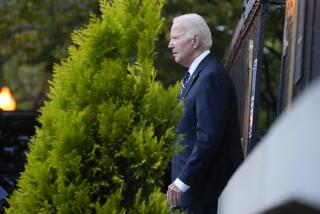Debate Emerges on Gates-CIA Iraq Role : Intelligence: At issue is director-designate’s still-secret and sensitive relationship with Baghdad during its war with Iran.
WASHINGTON — As the Senate Intelligence Committee prepares for hearings next week on the nomination of Robert M. Gates to be director of central intelligence, a closed-door debate is emerging over whether to release still secret and highly sensitive information related to Gates’ role in expanding U.S. relations with Iraq in the mid-1980s.
While declining to divulge details, some sources close to the committee have suggested that questions about intelligence the United States supplied to Iraq during its war with Iran could be as damaging to Gates’ confirmation chances as those concerning his role in the Iran-Contra affair.
“Bob Gates has a disadvantage, in relation to past nominees who have not come from the intelligence community, of having a long record. Iran-Contra is not the best part of that record, but it is wrong to presume it’s the worst part of it,” one committee source said.
Asserting that Gates may have been involved in “activities that were not fully or properly authorized” at the time, one committee member, Sen. Bill Bradley (D-N.J.), said he plans to question the director-designate at length about certain aspects of the U.S.-Iraq relationship. The questions involve activities from 1985 on, when Washington began supplying Baghdad with intelligence information about its war adversary, Iran.
Bradley said he wants as much of the questioning as possible to be held in open session, but other sources said Committee Chairman David L. Boren (D-Okla.) is expected to resist that. Citing the “very delicate” nature of some of the information, one senior source said he feared that disclosure could jeopardize the chances that more Western hostages may soon be released by pro-Iranian militants in Lebanon.
Boren said earlier that he expects “about 90%” of the hearings to be held in open session, with the committee moving behind closed doors only when the questions involve answers relating to classified intelligence assessments. Another area where the questioning will be closed involves allegations that Gates as deputy director of the CIA slanted intelligence estimates about the Soviet Union to make them conform to his conservative views.
While Gates’ early warnings about the possibility of a hard-liner coup have proven almost prophetic, critics such as Bradley contend he was “absolutely wrong” in predicting that, with or without Mikhail S. Gorbachev, the Soviet Union would remain locked in a long and bitter adversarial struggle with the United States.
One of the committee’s concerns, Boren conceded, is whether Gates “conducted himself appropriately in terms of maintaining the objectivity of intelligence analyses” or whether, as Bradley alleges, he may have “shaped the analyses to justify the defense build-up.”
Similar allegations have also surfaced in connection with the CIA’s analysis of the eight-year Iran-Iraq war, committee sources said. There have been suggestions, for instance, that the CIA exaggerated the extent of Iran’s vulnerability to Soviet influence as a way of justifying secret U.S. support for Iraq.
Although the extent of that assistance was not fully appreciated at the time, the United States played a critical role in helping Iraq beat back the Iranian siege of Basra.
Details of the secret assistance have only recently begun to come under congressional scrutiny. Bradley, in an interview with The Times, appeared to suggest that the intelligence committee had evidence not yet declassified when he alluded, without elaboration, to improperly authorized “activities” in which Gates may have been involved.
Asked about Gates on Thursday, President Bush again strongly defended his nominee. “I have total confidence in his honor, his integrity, if you will, his word of honor,” Bush said of Gates. “And I think he will be confirmed.”
More to Read
Get the L.A. Times Politics newsletter
Deeply reported insights into legislation, politics and policy from Sacramento, Washington and beyond. In your inbox three times per week.
You may occasionally receive promotional content from the Los Angeles Times.










